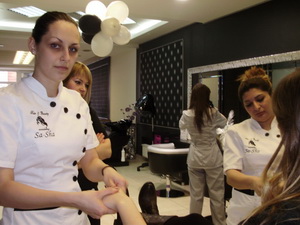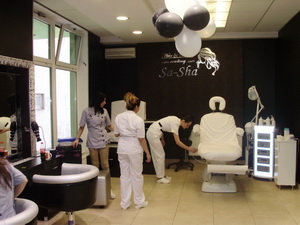 As part of the project of cross-border cooperation between Serbia and Bosnia and Herzegovina, 24 young persons of Roma nationality from Šabac, as well as majority population have been given an opportunity to acquire professional hairdresser and beautician skills.
As part of the project of cross-border cooperation between Serbia and Bosnia and Herzegovina, 24 young persons of Roma nationality from Šabac, as well as majority population have been given an opportunity to acquire professional hairdresser and beautician skills.
Female hairdresser course attendees, dressed in modern grey uniforms, and female beautician course attendees dressed in white uniforms are carefully listening to their lecturers. A combined theoretical and practical lecture is in progress. Girls gathered around the table where cosmetic and body and face beauty treatments are done listen to Esthetics Instructor Svetlana Topalović. With a sound of a hairdryer in the background, future hairdressers are carefully listening to every word uttered by hair care specialist Aleksandra Simić.
As of September, the Sa-Sha Academy, in downtown Šabac, 24 course attendees aged between 16 and 33 – including three boys, Roma and girls who belong to the majority population are learning to acquire professions which will enable them to find an employment or become self-employed.
The training is part of the SA-SHA project: support to cooperation, inclusion, education and promotion of Roma culture in Bosnia and Herzegovina and Serbia implemented from April 2013 to July 2014.
– The aim is to enable the inclusion of Roma population. The best method to implement this in the first place envisages erasing the differences and enabling opportunities to acquire knowledge and profession, to give the Roma an opportunity for education, says National Council for Roma National Minority Deputy President and its Regional Office Head in Šabac Sofka Vasiljković.
Partner organizations are the Town of Sarajevo and the Agency for Economic Development (SERDA) and Austrian Hilfswerk Austria international. The sponsor of the project is the EU Delegation, which provides 80% of the total project’s value.
Project Coordinator Aleksandar Vasiljković says that the value of the project is EUR155,000 and that the Academy is only one segment.
– We have decided not to enable education only to Roma women, because, in the cooperation with the National Employment Agency, we have determined that these occupations are scarce. Three young men applied as well, and some of the attendees are also members of the majority population, he adds.
The project covers the territory of four municipalities: Šabac, Loznica, Bogatić and Koceljeva.
The training is based on latest knowhow based on the experience of hair and beauty academies from London, Paris and Milan. It has two levels: the basic module lasts five months and the advanced level another six months. Textbooks have been written and a classroom for theoretical lectures has been equipped, in addition to the space of the beauty salon.
The youngest attendee is Valentina Vasić (16). His father informed her about the course. She explains that she wants to gain financial independence as soon as possible and start earning her own money. At 21, Jelena Dukić is somewhat older than Valentina. She lives in the village of Drenovac, 13 km from Šabac. She does not mind travelling and cheerfully attends school lessons every day. She attended both courses at the same time. She hopes to pass the exams and then, a few months, decide which out of these two occupations suits her better.
– My entire family is proud of me. Until I started attending the course, I stayed at home all the time, I have only elementary school education and could not find job anywhere, Jelena is sincere.
Nataša Nedić (25) is an academic painter. She cannot find employment in her field and she has always shown interest in anatomy and body care. She was registered with the National Employment Agency (NZS) as an unemployed individual when she saw the invitation for this training.
– I hope that with this retraining, I will find a job more easily. In addition, these are useful skills. You can always give a massage to a neighbour and improve home budget in that way, she explains.
Training lessons are held every day and the salon will become operational after the completion of this project.
 – The project envisages that after 15 months, the attendees are capable of working independently, to open their own beauty salons. We will keep the best of them here and we also wish to educate new attendees, Aleksandar adds.
– The project envisages that after 15 months, the attendees are capable of working independently, to open their own beauty salons. We will keep the best of them here and we also wish to educate new attendees, Aleksandar adds.
Sofka Vasiljković adds that they do not have the support of the local community. She addressed them and asked them to enable at least free transport for the attendees who have to travel to Šabac but they were not willing to meet the demands.
– The Regional Office is taking care of that. We are aware of the fact what having an occupation means for each young Roma girl, to be able to earn her own money, to be independent.
Our interlocutor underlines that the image of the status of Roma people when it comes to their education in a municipality with cca 70,000 inhabitants (out of which, according to the estimations, some 10,000 are of Roma nationality) is changing for the better.
– The changes might advance slowly but it is important to see the progress. Until three or four decades ago, there were three people with higher education. Today, we have three Roma females attending MA studies, one PHD student and 15 who are students. The number of Roma children attending pre-school institutions is increasing each year, Ms Vasiljković proudly says.
In addition to the Academy, the cross border cooperation project also includes computer training courses and program development, literary nights, exhibitions of work of Roma people, seminars on equality, reproductive health and the importance of inclusion.
Serbia is one of nine countries of Southeast and Central Europe in which the Decade of Inclusion of Roma 2005 -2015 is implemented.
 Government of the Republic of Serbia
Government of the Republic of Serbia















 pdf [271 KB]
pdf [271 KB]
Leave a Comment